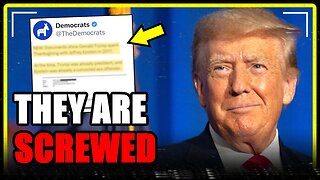Premium Only Content

Everything CHANGED In The 80’s
In the 1980s, American politicians began to increasingly rely on large corporate donations as a means to fund their campaigns. This shift was largely influenced by changes in campaign finance laws and the growing influence of money in politics.
One key factor that contributed to this trend was the Supreme Court's 1976 decision in the case of Buckley v. Valeo. This ruling equated campaign spending with free speech and upheld limits on individual contributions to political campaigns but struck down restrictions on independent expenditures. This decision opened the door for corporations and wealthy individuals to spend unlimited amounts of money to support political candidates or causes, leading to the rise of political action committees (PACs).
The emergence of PACs in the 1980s played a significant role in the increased corporate donations to politicians. These organizations allowed corporations to pool their resources and make substantial contributions to candidates they supported. PACs became a way for corporations to gain access and influence in the political sphere, as politicians increasingly relied on these donations to fund their campaigns.
Additionally, the 1980s saw the rise of "soft money" in political campaigns. Soft money refers to contributions made to political parties rather than directly to candidates. While there were restrictions on how soft money could be used, loopholes allowed parties to use these funds for activities that indirectly benefited specific candidates. This enabled corporations to donate large sums of money to political parties, indirectly supporting their preferred candidates without violating direct contribution limits.
The increased reliance on corporate donations in the 1980s had significant consequences for American politics. It led to concerns about the influence of money in shaping political decisions and policy outcomes. Critics argued that politicians became more responsive to the interests of corporations rather than the needs of ordinary citizens. The influence of corporate donations also fueled perceptions of a "pay-to-play" system, where access and influence were granted to those who could afford to make substantial contributions.
Ultimately, the 1980s marked a turning point in American politics as politicians increasingly sought and accepted large corporate donations to fund their campaigns. This shift in campaign financing practices had a lasting impact on the political landscape and raised important questions about the role of money in shaping democratic processes and policy outcomes.
#politics #bigpharma #militaryindustrialcomplex #president #corruption #cia #war #greed #presidentialcampaign #wallstreet #usa #america
-
 9:47
9:47
MattMorseTV
1 day ago $79.45 earnedDemocrats CAUGHT in $15,000,000 LIE.
126K133 -
 1:47:55
1:47:55
Surviving The Survivor: #BestGuests in True Crime
1 day agoDan Markel Murder: Juror from Katie Magbanua's Trial Speaks Out for 1st Time
11.1K -
 18:03
18:03
stateofdaniel
2 days agoJen Psaki PANICS on Live TV, BACKPEDALS After Smearing Trump with Epstein—Fears LAWSUIT!
14.1K36 -
 18:31
18:31
Nikko Ortiz
1 day agoKaren You Need A Shower...
36.1K21 -
 1:09:52
1:09:52
VapinGamers
5 hours ago $8.01 earnedTools of the Trade - EP11 Highs and Lows of Streaming with Gothix - !rumbot !music
26.7K2 -
 LIVE
LIVE
SOLTEKGG
6 hours agoARC RADIDERS "First Month-Anniversary on Rumble"
120 watching -
 2:14:09
2:14:09
LFA TV
23 hours agoRUMBLE RUNDOWN WEEK 6 with JEREMY HERRELL AND SHAWN FARASH 11.15.25 9AM
178K13 -
 1:44:16
1:44:16
HotZone
8 hours ago $6.92 earnedLive: The Hidden Crisis in US Special Ops: What They’re Not Telling You About Women in Combat
27K21 -
 53:25
53:25
Athlete & Artist Show
22 hours ago $3.51 earnedBombastic Bets & Games w/ Team Canada Veteran!
24.3K1 -
 53:13
53:13
X22 Report
6 hours agoMr & Mrs X - It All Revolves Around Marxism, Think Political Correctness, Midterms Are Safe - EP 16
86.4K25